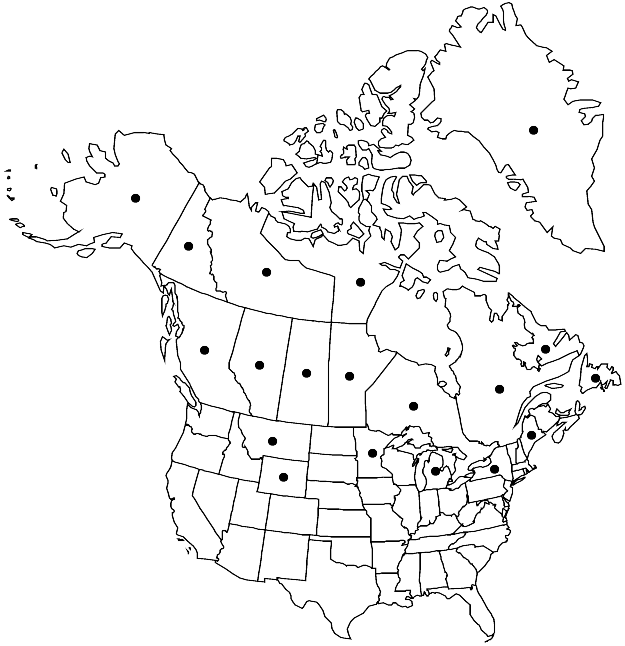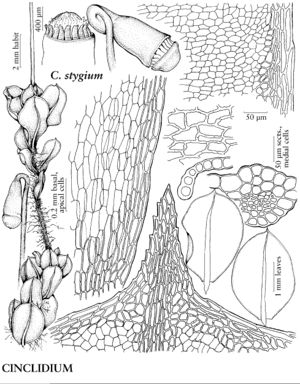Difference between revisions of "Cinclidium stygium"
J. Bot. (Schrader) 1801(1): 27, plate 2. 1803.
FNA>Volume Importer |
imported>Volume Importer |
||
| (6 intermediate revisions by 2 users not shown) | |||
| Line 9: | Line 9: | ||
|special_status={{Treatment/ID/Special_status | |special_status={{Treatment/ID/Special_status | ||
|code=F | |code=F | ||
| − | |label= | + | |label=Illustrated |
}} | }} | ||
|basionyms= | |basionyms= | ||
| Line 27: | Line 27: | ||
|elevation=low to moderate elevations | |elevation=low to moderate elevations | ||
|distribution=Greenland;Alta.;B.C.;Man.;Nfld. and Labr.;N.W.T.;Nunavut;Ont.;Que.;Sask.;Yukon;Alaska;Maine;Mich.;Minn.;Mont.;N.Y.;Wyo.;South America;Europe;Asia. | |distribution=Greenland;Alta.;B.C.;Man.;Nfld. and Labr.;N.W.T.;Nunavut;Ont.;Que.;Sask.;Yukon;Alaska;Maine;Mich.;Minn.;Mont.;N.Y.;Wyo.;South America;Europe;Asia. | ||
| − | |discussion=<p>Cinclidium stygium is often hidden among other mosses and sedges on wet soils. The species is distinguished by its broadly elliptic, ovate, or obovate leaves often with a sharp, squarrose apiculus or cusp.</p> | + | |discussion=<p><i>Cinclidium stygium</i> is often hidden among other mosses and sedges on wet soils. The species is distinguished by its broadly elliptic, ovate, or obovate leaves often with a sharp, squarrose apiculus or cusp.</p> |
|tables= | |tables= | ||
|references= | |references= | ||
| Line 36: | Line 36: | ||
-->{{#Taxon: | -->{{#Taxon: | ||
name=Cinclidium stygium | name=Cinclidium stygium | ||
| − | |||
|authority=Swartz | |authority=Swartz | ||
|rank=species | |rank=species | ||
| Line 50: | Line 49: | ||
|publication title=J. Bot. (Schrader) | |publication title=J. Bot. (Schrader) | ||
|publication year=1803 | |publication year=1803 | ||
| − | |special status= | + | |special status=Illustrated |
| − | |source xml=https:// | + | |source xml=https://bitbucket.org/aafc-mbb/fna-data-curation/src/2e0870ddd59836b60bcf96646a41e87ea5a5943a/coarse_grained_fna_xml/V28/V28_348.xml |
|genus=Cinclidium | |genus=Cinclidium | ||
|species=Cinclidium stygium | |species=Cinclidium stygium | ||
Latest revision as of 21:35, 5 November 2020
Plants 3–8(–13) cm. Stems dark brown. Leaves reddish green, reddish brown, or black when old, spreading, ± flat, not strongly reflexed when moist, broadly elliptic, ovate, obovate, or rarely ± orbicular, (2.5–)3.5–4.5(–6) mm; base short-decurrent, occasionally not decurrent; margins narrowly to broadly recurved or rarely nearly plane, 1-stratose; apex obtuse or rounded, sometimes acuminate or acute, apiculate or cuspidate, apiculus sharp, cusp usually toothed; costa percurrent, excurrent, or rarely subpercurrent; medial laminal cells elongate, (50–)60–75(–100) µm, in diagonal rows, not collenchymatous; marginal cells short-linear or linear, in (2–)3–4 rows. Sexual condition synoicous. Seta yellowish, 4–7 cm. Capsule yellowish, ovate-elliptic, 2–3 mm. Spores 25–70 µm.
Phenology: Capsules mature summer.
Habitat: Fens, alpine seeps, in shoreline pools
Elevation: low to moderate elevations
Distribution

Greenland, Alta., B.C., Man., Nfld. and Labr., N.W.T., Nunavut, Ont., Que., Sask., Yukon, Alaska, Maine, Mich., Minn., Mont., N.Y., Wyo., South America, Europe, Asia.
Discussion
Cinclidium stygium is often hidden among other mosses and sedges on wet soils. The species is distinguished by its broadly elliptic, ovate, or obovate leaves often with a sharp, squarrose apiculus or cusp.
Selected References
None.
